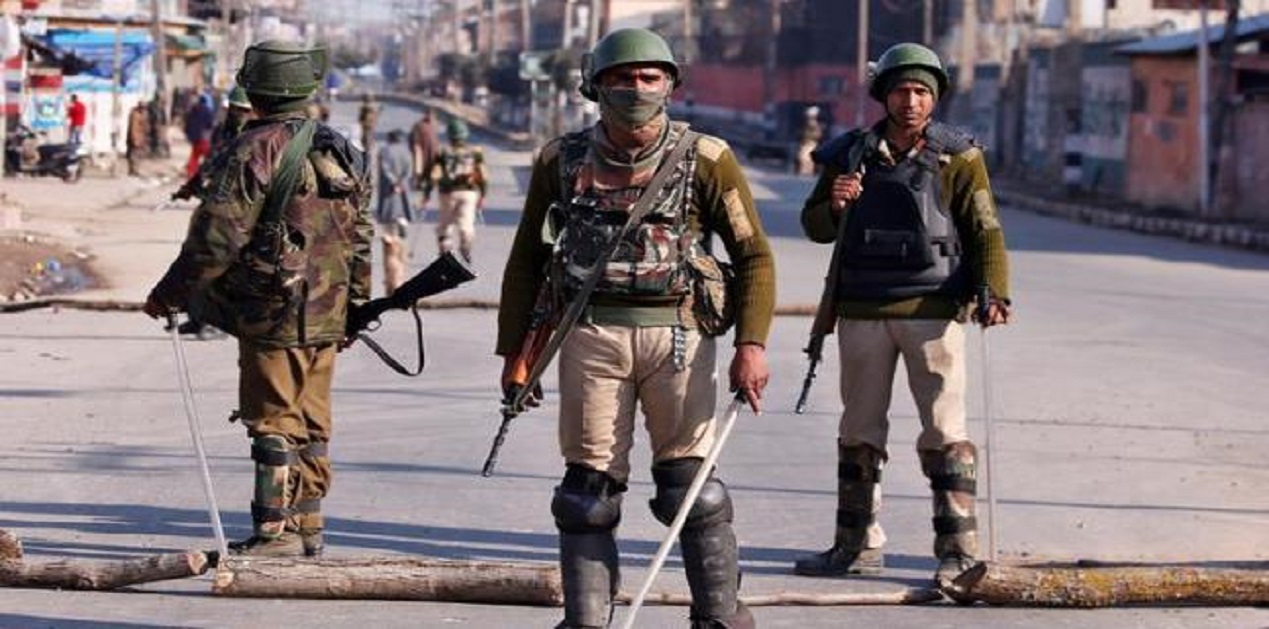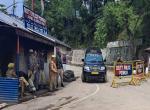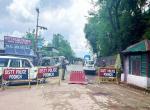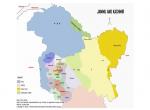The security situation in the Kashmir region has been spiraling downward since 2008. This is essentially because Pakistan-backed separatists have devised a new strategy to sustain the unrest.
The problem now is not the militant holding the gun, but the mobs ruling the streets. This is a generation of unarmed militants. When a situation turns ugly following some incident, it takes the administration four to six months to restore order on the streets of Kashmir. The magnitude of the street protests over these years and the time taken to ease the situation should have alarmed policy makers and state institutions. It should have led to deep analysis and formulation of suitable response plans. That did not happen.
If conflict fatigue and cynicism had not hit Kashmir, the state would still have been wondering how to quell the violent protests. Causalities in the protests have always been an issue, and have invited criticism for the state from various quarters. Security forces engaged in Kashmir have dealt successfully with law and order situations. Since 2008, more than 1000 militants have been killed by the security forces. The forces on ground have been able to control five major agitations since 2008. With tactical wisdom, the state is able to successfully mount anti-terrorist operations. Terrorists are being eliminated almost on daily basis.
The larger challenge before the state is in dealing with an entire populace when it adopts the agitation mode. This makes it difficult for the uniformed forces to restore order. For months together, mobs rule the streets and chaos prevails, leaving the civil and security apparatus bewildered. One may argue that the level and magnitude of such agitations have come down significantly over last one and a half years. Fatigue with conflict and cynicism regarding the struggle has waned the enthusiasm of the Kashmiris towards street protests.
Recently, a policeman named Farooq Ahmad Reshi was killed by a terrorist in Bijbehara town outside a mosque. The terrorist decamped with the weapon of the policeman. The situation in Kashmir seems no better than in yesteryears. Why is it so? One, there is lack of coordination among the uniformed forces operating in Kashmir. The first phase of violence from 1989 to 2001 was far bloodier. Militants were in thousands. Pakistan and its deep state was vigorous in promoting the insurgency. The influx and import of militants and weaponry was very high. Despite these major challenges, the security forces successfully restored order in Kashmir. By 2002, militancy had suffered a huge blow in Kashmir. There were almost no incidents of militant violence, and their numbers went down from about 30 to 60. Jammu and Kashmir Police played a pivotal role in the anti-terrorism drive. Military and para-military troops deployed in Kashmir worked in close coordination with the local police.
The policy makers and strategists created a new force out of the conventional police force of Jammu and Kashmir. This strategy was instrumental in containing militancy. The Special Operations Group (SOG) of Jammu and Kashmir Police was raised in 1994 with the idea of "involving the passive Jammu and Kashmir Police in anti-terrorist activities and giving a local face to these operations". The SOG comprised about 1000 cops out of a police force with about 3,00,000 personnel. SOG helped in bringing JK Police on the forefront of anti-terror activities. Initially 45 to 50 police constables, mostly from the frontier districts of Poonch and Kupwara, were brought into the SOG. These special forces were headed by Farooq Ahmad Khan, who later retired as Inspector General of Police. Post-retirement, he was appointed as the Administrator of Lakshadeep, and has recently been appointed to the Advisory Council of the Jammu and Kashmir Governor.
In every district, SOG was headed by Superintendent of Police (SP) or a Deputy SP Operations. SOG was a volunteer force comprising police officers and policemen. The volunteers joined SOG for varied reasons. Some had the passion to fight terrorism. Others were motivated by the high incentives. Along with the military, CRPF and BSF, SOG played a vital role in containing the first phase of militancy. The General Officer Commanding (GOC) Northern Command, the Corps Commander of 15 Corps and other top brass of the Army enjoyed a cordial understanding with the DGP of Jammu and Kashmir Police. Local Commanding Officers of the Army and police officers at district level regularly shared intelligence inputs for better coordinated efforts to wipe out terrorists. In time, SOG earned a tag of notoriety in dealing with law and order situations. For terrorists, it became the most hated force among all the uniformed forces on ground zero. All through this, security forces with SOG at the forefront were successful in dealing with the terrorism in Kashmir valley. Whenever there was a militant attack in Jammu & Kashmir, SOG personnel would be the first ones to reach the spot. In addition, SOG personnel were regularly called to control violent protesters.
Synergy in action was the secret of the success of the security forces against militants. Lack of coordination between the various forces operating in Kashmir is the reason for the deteriorating law and order situation now. The last three years of the fight against terrorism has brought to the fore some hard facts that cannot be ignored. Take for instance the Febuary 14 Lethpora attack, in which 45 CRPF men were killed by a suicide bomber. Jammu and Kashmir Police had issued a red alert following intelligence inputs. The CRPF ignored the inputs, leading to disastrous consequences. Another factor of dismay was that the DGP of Jammu and Kashmir Police could not develop a working relationship with the Army and the CRPF top brass. As a result, the Army would go for terrorist operations on its own. Due to the absence of local police force at the encounter site, the situation consistently became troublesome for both the Army and the local populace.
In some operations, particularly in Pulwama and Anantnag districts during the last three years, local Senior Superintendents of Police (SSPs) earned public appreciation because all the forces were involved in the operations. In at least three operations, the SSP Pulwama called on the parents of the terrorists trapped at the encounter sites to appeal their wards to surrender. This act of the police officer earned huge appreciation from the local population. Similarly, the Senior Superintendent of Police of Anantnag district called the parents of the trapped terrorists on at least two occasions, asking their wards to surrender.
Better coordination between the uniformed forces on ground achieves more than we realize. 2013 was a relatively peaceful and calm year despite the fact that Parliament attack convict Afzal Guru was hanged on February 9 that year. A huge upheaval was expected that year, but it was did not happen. A major factor was the synergy between the Jammu and Kashmir Police, Army and other para military forces. The authorities executed Afzal Guru in Tihar Jail on February 9 in the morning. By then, J&K Police had executed its plan to ensure law and order in Kashmir. I was told that the then SSP Srinagar was informed by the then IGP Kashmir at 1:30 am about the plan to execute Afzal Guru. SSP Anantnag was informed by the IGP at 4:30. It took the district police just one hour to put the contingents in place to quell any unrest.
This was a standard practice those days. The District Police Control Rooms would inform the paramilitary CRPF commanders in the respective districts to deploy contingents wherever and whenever required. The local police men would always be at the site in advance to guide and supervise the security plans. Unfortunately, this time around this synergy is missing. Wherever local district police officers or SPs have good working relationship with the Army commanders, success rate of operations is huge and collateral damages are minimum.
The Jammu and Kashmir Police is a very important stakeholder in the maintenance of peace in the state. It is a vital component of the security grid in Kashmir. Being local, the police force is highly vulnerable. The killings and kidnapping of the relatives of police officials in 2017 and 2018 by terrorist groups in various parts of Kashmir point to the vulnerability of the men in Khaki in Kashmir. From this angle too, the local police force should have a major role in devising anti-terrorism strategies in Kashmir. A realistic reappraisal will ensure that the response systems to militancy are tailored appropriately.
The so-called successive popular governments in Jammu and Kashmir, particularly the last two governments headed by Mufti Muhammad Sayeed and his daughter Mehbooba Mufti systematically eroded the status, stature and dynamism of the Jammu and Kashmir Police. The party in power was complacent towards terrorism to safeguard their political fortunes. The erosion has a detrimental impact on the morale of the local police force. The police also had to compromise on its leadership role in combating terrorism. In Bollywood style, political workers, ministers and leaders would threaten SPs with transfers if they didn’t follow the dictates. The result was that police officers lost the zeal and vigour to combat anti-insurgency activities. Corruption in the police force has also impacted the overall law and order situation. Corruption and political interference has rendered the Jammu and Kashmir police force toothless. I will deal with how corruption has eroded the legitimacy of JK Police in a separate write-up.
Jammu and Kashmir Police must have a pivotal role and greater visibility on ground in combating terrorism. The Army is capable of dealing with terrorists but it cannot eliminate terrorism. We have a huge army of unarmed, ideologically oriented militants. Jammu and Kashmir Police have a huge local network which can significantly help in breaking the vicious cycle of recruitment. It has the requisite expertise and experience in counseling potential recruits in militancy. Sleeper cells of the terrorist organizations cannot be traced without the involvement of Jammu and Kashmir police. The unified command of the security apparatus in the state must meet on weekly basis to infuse the element of synergy and freshness in the strategies to fight terrorists. Jammu and Kashmir Police should be entrusted with the job of supervising anti-insurgent operations. Successfully erasing militancy in Punjab taught us the valuable lesson that politically and militarily, it is wise to localize the fight against terrorism.
(The paper is the author’s individual scholastic articulation. The author certifies that the article/paper is original in content, unpublished and it has not been submitted for publication/web upload elsewhere, and that the facts and figures quoted are duly referenced, as needed, and are believed to be correct). (The paper does not necessarily represent the organisational stance... More >>
Image Source: https://akm-img-a-in.tosshub.com/indiatoday/images/story/201808/police_0.jpeg?B695sp4wfANKJ.9fZQONFkZ9E_DNZ_tC










Post new comment